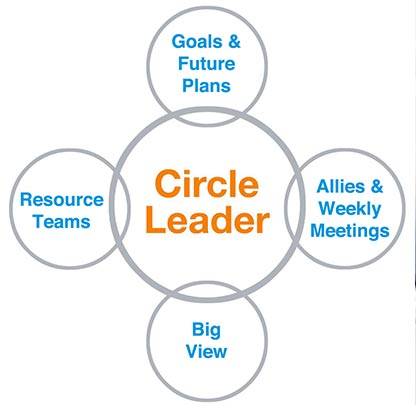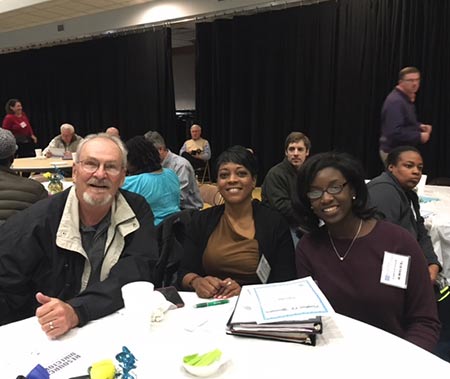WHAT IS CIRCLES GREENVILLE COUNTY?
Mission
Circles provides opportunities that inspire and equip families and communities to resolve poverty and thrive!Circles Greenville County believes the ultimate responsibility for poverty or prosperity in our community rests not only in the hands of individuals, but within all sectors of our community. By engaging all segments of Greenville County, people learn to see each other differently and to think in new ways about poverty and how to eradicate it.
Background
To that end, Buncombe Street United Methodist Church and SHARE have teamed up to bring Circles Greenville County to our community. As the first Circles chapter in South Carolina, we are connected to a network of 70+ Circles communities across 23 states and parts of Canada. CirclesUSA is our parent organization. For more information on them, please visit www.CirclesUSA.org.WHY CIRCLES WORKS FOR OUR COMMUNITY
- Circles is a model our community uses to replace Cycles of Poverty with Circles of Prosperity by supporting low-income families to improve their lives.
- Circles is grounded in research that indicates low-income families must have strong social capital and human connections across class and cultural lines in order to improve their economic situation.
- Circles is designed to facilitate systemic changes in our community by bringing community leaders and others together to remove barriers to economic stability so families can thrive. Some current barriers are: poor public transportation system, lack of affordable and quality housing units, and Cliff Effects of mainstream benefits such as losing food stamps and child care vouchers when a person receives a raise, which dis-incentivizes employment.
GOALS FOR CIRCLES GREENVILLE COUNTY
THE CIRCLES MODEL - HOW CIRCLES WORKS
 Circles offers a comprehensive program for low-wealth adults who are willing and ready to move out of poverty. In the initial 12-week training class, our low-wealth adults (called Circle Leaders) establish personal Goals and Future Plans that help them exit poverty. They learn new tools to secure and sustain better jobs which lead to careers with income growth and advancement.
Circles offers a comprehensive program for low-wealth adults who are willing and ready to move out of poverty. In the initial 12-week training class, our low-wealth adults (called Circle Leaders) establish personal Goals and Future Plans that help them exit poverty. They learn new tools to secure and sustain better jobs which lead to careers with income growth and advancement.
Once Circle Leaders complete this initial training, they are matched with two (2) community volunteers known as Allies. Allies go through training to better understand the world of poverty and to be able to communicate effectively across class and cultural lines. Allies make an 18-month commitment to their Circle Leader to walk with them and assist them in achieving their Goals. Allies offer Circle Leaders coaching, job leads, problem solving help, and the essential modeling required to achieve success. Allies expand the social capital of Circle Leaders by giving them access to their own social and business networks, which are often wider, stronger, and more diverse than those of Circle Leaders. Both Allies and Circle Leaders are supported and guided by Circles Greenville County staff along this journey.
Showing up to Weekly Meetings or maintaining weekly contact is the key to success for both Circle Leaders and Allies. The weekly meetings/contacts are used to discuss the Circle Leader's plan, see where they are in achieving their goals, and offering assistance (where appropriate) in helping them reach their goals.
Resource Teams are volunteers with connections to community resources which aid Circle Leaders (and Allies) in keeping them moving forward when life's upsets occur. Circles Greenville County brokers existing community resources into each Circle Leader's plan. The long-term solution provided by Circles is a necessary complement to other short-term support and training programs.
Once a month, Circles holds a Big View meeting open to the public and community leaders to talk about progress being made by Circle Leaders as well as to identify and solve community-wide barriers slowing down the progress of people intent on moving out of poverty. Some of these community-wide barriers include a poor public transportation system, a lack of affordable and quality housing, and Cliff Effects of mainstream benefits such as losing food stamps and child care vouchers when a person receives a raise, which dis-incentivizes employment. People in positions of power are encouraged to participate in Big View meetings because they are the ones which can modify policies that are detrimental to people in poverty. Having middle- and upper-income allies and volunteers from Circles advocate on behalf of our low-wealth neighbors increases the likelihood positive and healthier policies will be enacted.

